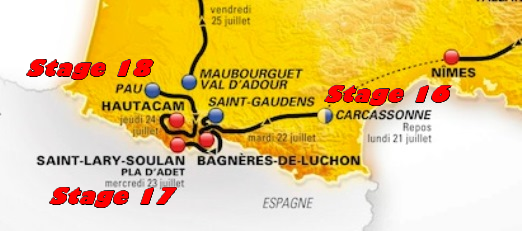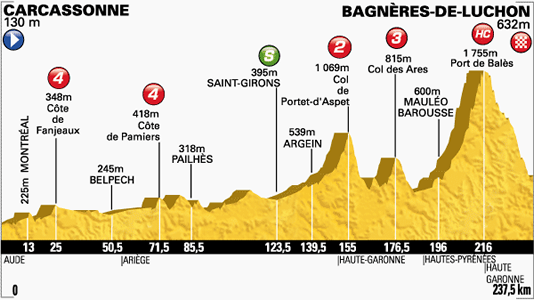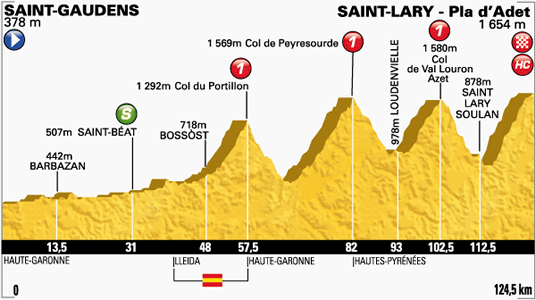| |
By Barry Boyce
CyclingRevealed Historian
Also see:
Top 25 Tour de France
Tour de France Champions Living and Dead
Bastille Day Winners
20th Century Timeline
Race Snippets
|
|
Tour de France 2014
Defining the "Circle of Death"
By definition the “Circle of Death” is the hardest Tour de France stage in the Pyrenees Mountains. It is a place where many hopes for the overall Tour victory die.
Since 1910 the Tour de France has included an incursion into the high passes of the Pyrenees Mountains. Stage ten in 1910 included four brutal climbs, featuring the first ascent of the Col du Peyresourde, the Col d'Aspin, the Col du Tourmalet, and the Col d'Aubisque. The press wrote of the new stage routes into the wilderness of the Pyrenees as “dangerous” and “bizarre.” Of course this was much to the delight of race director Henri Desgrange and his sponsoring newspaper Le Auto.
July 27, 1910 was a very hot day in the south of France and race officials anxiously waiting at the top of the Aubisque watched to see if any rider could make it over both the Tourmalet and the Aubisque. Lapize a climbing specialist walked, ran, and pedaled his way up the climbs. Local rider Francois Lafourcade passed him and won the last climb. Fifteen minutes after Lafourcade, the second rider, Octave Lapize, appeared in great distress and pushing his bike. Upon reaching the top Lapize angrily shouted “ASSASSINS...” at the race officials as he passed. Across the top of the Aubisque Lapize was able to recover, catch Lafourcade on the way into Bayonne, and win the stage.
Octave Lapize went on to earn a grand victory in the 1910 Tour de France and Henri Desgranges saw the new ‘mountain formula' become a great success. With the inclusion of the dangerous Pyrenees Mountains and the riders shouting “Assassins...” and “Murderers...” Tour legend was made in 1910. The press contributed tremendously to the legend by naming the hardest day in the Pyrenees “The Circle of Death”, where hopes of a Tour de France victory go to die.
In 2014 we will be treated to three brutal stages in the Pyrenees Mountains:

Stage 16, a 237.5 km stage over five categorized climbs:
Category 4- Cote de Fanjeaux (2.4 km climb at 4.9%)
Category 4- Côte de Pamiers (2.5 km climb at 5.4%)
Category 2- Col de Portet-d'Aspet (5.4 km climb at 6.9%)
Category 3- Col des Ares (6 km climb at 5.2%)
HC- Port de Balès (11.7 km climb at 7.7%).

x
TdF Expert: Thierry Gouvenou's View of stage 16:
The longest stage of the 2014 Tour comes right up the second rest day. With 237.5 km on the menu and the Port de Balès as a dessert, the riders will spend about six hours on the saddle.
The last few years have shown that riders who make it to the top with a margin of 30 to 40 seconds can rest assured of keeping it until the finish and taking the win in Bagnères-de-Luchon. The odds are on the attackers' side, thus. Sure, this does not look like the toughest stage in the Tour, but remember that this is where Andy Schleck lost the yellow jersey due to a mechanical in 2010.
|
Stage 17, a short 124.5 km stage climbing 4 categorized climbs:
Category 1- Col du Portillon (8.3 km climb at 7.1%)
Category 1- Col de Peyresourde (13.2 km climb at 7%)
Category 1- Col de Val Louron-Azet (7.4 km climb at 8.3%)
HC- Montée de Saint-Lary Pla d'Adet (10.2 km climb at 8.3%).

x
TdF Expert: Thierry Gouvenou's View of stage 17:
At 125 km, the shortest stage comes just after the longest. To be honest, it will be a hectic 125 kilometres, since it is all up and down from kilometre 50 all the way until the summit finish on Plat d'Adet. Even the leaders will find this a tricky stage. And the riders in the autobus... For them, it will be a stage of trials and tribulations, with a tight elimination time which will force sprinters to spend the entire stage à bloc. Several green jersey contenders could end up having to pack their suitcases after this stage! The final podium will start to take shape. Without a doubt, the highlight of the race.
|
Stage 18, a 145.5 km stage over a category 3 climbs:
Category 3- Côte de Bénéjacq (2.6 km climb at 6.7%)
Category 3- Côte de Loucrup (2 km climb at 7%)
HC- Col du Tourmalet (Souvenir Jacques Goddet) (17.1 km climb at 7.3%)
HC- Montée du Hautacam (13.6 kilometre-long climb at 7.8%)

x
TdF Expert: Thierry Gouvenou's View of stage 18:
At 145.5 km, this stage is also quite short. Compared with the previous one, riders will probably see it as an opportunity to catch their breath. True, the elimination time will be more generous. Yet they would do well not to underestimate the stage. First of all, they will have to climb the Col du Tourmalet, always a challenge. Next up, the final climb up Hautacam, which has earned a hallowed place in the history of the Tour. We hope the Tourmalet is used as a launch pad for attacks and does not go to waste. If so, pretenders to a podium spot or even the overall win could use it to claw back some time.
|
Which stage will prove to be defined as the entry into the 2014 Circle of Death is a matter for discussion. For sure this year's entry into the Circle of Death will see more than one Tour contender's GC hopes die.
Over the years countless TdF contenders have seen their hopes disappear in the Pyrenees Mountains:
-
In 1991 the Col du Aubisque marked the start of what would be Miguel Indurain's drive to five consecutive Tour wins. Defending champion Greg LeMond tried to repeat his attack on the Col du Tourmalet, but cracked on the Aubisque. He lost over seven minutes to Indurain, and was never again to wear the yellow jersey.
-
In 1996 Bjarne Riis put a strangle hold on the race with a commanding performance. On the stage that finished at the summit of Hautacam, Riis used continual surges on the steepest section of the road and dropped everyone, including the defending champion Miguel Indurain. The stage signaled the end of Indurain's five-year Tour reign.
The “Circle of Death” has claimed more than one contender over the years. .
.
Return to CR ToC >>> |
|
